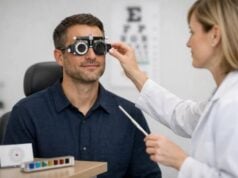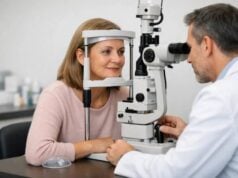
Good vision rarely hinges on one habit. It is usually the result of small, repeatable choices—how you manage screens, how well you sleep, and what nutrients you consistently give your eyes over years. Supplements can play a role in that picture, but the role is narrower than most marketing suggests. For a few conditions, specific formulas have solid evidence and clear “who should use it” guidance. For many everyday concerns—like tired eyes after a long workday—supplements may help some people, yet the effect is often modest and depends on the cause.
This article explains what eye-health supplements can realistically do, which ingredients matter most, and how to choose products safely. You will also learn when supplements are worth discussing with an eye-care professional, and when simple behavior and nutrition changes offer a bigger return.
Essential Insights
- Targeted formulas can slow progression in certain stages of age-related macular degeneration, but they do not prevent it in healthy eyes.
- Omega-3 supplements may help dry eye in some people, yet results vary and dosing and baseline status matter.
- Supplements cannot correct nearsightedness, farsightedness, or astigmatism, and they are not a replacement for eye exams.
- Avoid high-dose combinations if you are pregnant, on blood thinners, have kidney disease, or are a smoker using beta-carotene products.
- The most practical approach is “food first,” then condition-specific supplements only when the evidence fits your risk profile.
Table of Contents
- What eye supplements can and cannot do
- Which nutrients matter most for eyes
- Who benefits from AREDS2 and why
- Do supplements help dry eye and screen strain
- Safety and interactions you should know
- How to build a smart eye supplement plan
What eye supplements can and cannot do
The most helpful way to think about supplements is this: they support tissue health and reduce certain risks, but they do not “upgrade” eyesight like a new prescription lens. If your blur is caused by refractive error (myopia, hyperopia, astigmatism), supplements will not change the shape of your cornea or lens. If your blur is from dry eye, allergy, poor sleep, or long hours of close work, supplements might help indirectly—but often only as one piece of the solution.
Where supplements can be genuinely useful is in risk reduction and disease management. The best-known example is a specific high-dose vitamin and mineral formula used for age-related macular degeneration (AMD) in defined stages. In that setting, the goal is not sharper vision tomorrow. The goal is slower progression over years. That distinction matters, because many people start supplements hoping for a quick change and then quit too early—or keep taking an expensive formula that was never meant for their situation.
Supplements can also be reasonable when diet quality is low, absorption is impaired, or needs are higher than usual. For example, someone who rarely eats oily fish may struggle to reach omega-3 levels associated with ocular surface benefits. A person with very limited fruit and vegetable intake may run low on carotenoids (plant pigments) that accumulate in the macula. In these cases, supplements can help “close gaps,” but the effect is still limited by the underlying cause.
It is also important to name what supplements cannot safely replace:
- A dilated eye exam and retinal evaluation when there are new symptoms (flashes, floaters, sudden blur, distortion, eye pain, or one-sided vision changes).
- Management of diabetes, blood pressure, or smoking status—three drivers of long-term eye disease risk.
- Practical dry-eye strategies such as blinking habits, screen breaks, humidity, and appropriate drops when needed.
A realistic expectation is that supplements are most valuable when they are (1) condition-specific, (2) correctly dosed, (3) taken consistently, and (4) paired with the habits that remove ongoing strain and inflammation. If you want the best odds of benefit, start by identifying the “why” behind your eye complaint—then decide whether a supplement fits that why.
Which nutrients matter most for eyes
Eye-health supplements are often sold as long ingredient lists, but a handful of nutrients have the strongest rationale because they either concentrate in eye tissue or influence processes that commonly drive eye problems: oxidative stress, inflammation, and blood vessel health. “Oxidative stress” is the wear-and-tear from reactive molecules produced during normal metabolism and light exposure. The retina, with its high oxygen use and constant light exposure, is especially sensitive to it.
The most evidence-backed nutrients fall into a few groups:
Carotenoids (lutein and zeaxanthin). These are pigments found in leafy greens and egg yolks that accumulate in the macula, the area responsible for sharp central vision. They help filter high-energy visible light and act as antioxidants. People with low dietary intake often have lower macular pigment density, which is one reason supplements sometimes target these compounds.
Vitamin C and vitamin E. These antioxidants help protect lipids and proteins from oxidative damage. They show up in eye formulas mostly because oxidative stress is strongly involved in AMD and cataract biology. Whole foods—citrus, berries, peppers, nuts, seeds—remain the best baseline source, but some clinical formulas use higher doses for defined conditions.
Zinc and copper. Zinc is used in antioxidant enzymes and is present in retina tissue. High-dose zinc can reduce copper absorption, which is why some formulas pair zinc with copper. This pairing is not a “nice to have.” It is there to prevent deficiency risk when zinc is high.
Omega-3 fatty acids (EPA and DHA). DHA is a structural fat in the retina and both EPA and DHA influence inflammation. Dry eye disease is often an inflammatory condition of the tear film and eyelid glands, which is why omega-3 supplements are frequently studied. Still, results vary, and “omega-3” is not one simple product—dose, form, and baseline diet all matter.
Vitamin A and related compounds. Vitamin A is essential for the visual cycle (how the retina converts light into signals) and for healthy surface tissue. True deficiency can cause night blindness and severe dryness, but in many well-nourished adults, deficiency is uncommon. High-dose vitamin A can be harmful in pregnancy and in some medical contexts, so “more” is not automatically better.
One practical way to use this information is to separate “foundation nutrition” from “therapeutic dosing.” Foundation nutrition looks like a consistent pattern: leafy greens most days, colorful fruits and vegetables, adequate protein, and healthy fats. Therapeutic dosing refers to a specific, studied formula used for a defined risk group, often at higher amounts than you would get from food. If you skip the foundation, supplements become an unreliable patch—especially for dry eye and fatigue, where sleep, screen behavior, hydration, and environment often drive symptoms as much as nutrients do.
Who benefits from AREDS2 and why
If you have ever searched “best supplement for eyes,” you have probably seen the AREDS2 formula mentioned. It is popular because it is one of the few supplement approaches with strong clinical trial evidence and clear criteria for use. The key word is criteria. AREDS2 is not a general “eye vitamin.” It is designed for people with specific stages of age-related macular degeneration (AMD), typically intermediate AMD in one or both eyes, or advanced AMD in one eye.
Why this matters: AMD progresses at very different speeds in different people. Treating everyone “just in case” would expose many low-risk people to high doses they do not need, and it would dilute the benefits for the people who actually do.
A commonly used AREDS2-style formula includes:
- Vitamin C 500 mg
- Vitamin E 400 IU
- Zinc 80 mg (as zinc oxide in the original trial dosing)
- Copper 2 mg (as cupric oxide)
- Lutein 10 mg
- Zeaxanthin 2 mg
You will see variations—especially on zinc dose—because some products use a lower zinc amount to reduce stomach upset and other side effects while still aiming for benefit. The practical takeaway is not to memorize numbers, but to match the product to your eye-care professional’s recommendation and your diagnosis.
It is also important to understand what AREDS2 does not do. It does not cure AMD. It does not restore lost central vision from advanced disease. It does not prevent AMD in people with no signs of AMD. Its job is risk reduction—specifically, lowering the chance that intermediate disease progresses to advanced stages over time.
If you are considering AREDS2, the most helpful questions to ask at your next eye appointment are:
- Do I have early, intermediate, or advanced AMD, and in which eye?
- Based on my retinal findings, do I fit the group that benefits from an AREDS2-type formula?
- If yes, should I use the standard zinc dose or a lower one given my stomach tolerance and medical history?
- Are there reasons I should avoid certain ingredients (for example, beta-carotene in smokers, or high-dose vitamin E with certain medications)?
Finally, remember that supplements cannot compete with the big lifestyle levers that influence AMD risk: smoking status, cardiovascular health, and dietary pattern. In practice, the strongest plan often looks like: AREDS2 for the right stage, plus smoking cessation, plus a diet rich in leafy greens and oily fish, plus good blood pressure and glucose control.
Do supplements help dry eye and screen strain
Dry eye is one of the most common reasons people try eye supplements. It is also one of the most misunderstood. Many people assume dry eye is simply “not enough tears,” but it is often a mix of tear evaporation, eyelid gland dysfunction, surface inflammation, and reduced blinking—especially during screen use. In other words, if you take a supplement but keep doing eight hours of unbroken screen time with low blink rate, you are working against yourself.
Omega-3 fatty acids are the best-known supplement option for dry eye, mainly because they can influence inflammation and the lipid layer of tears. Some trials show symptom and test improvements, while others show little difference compared with placebo. One reason results differ is that “omega-3 status” varies widely. People with very low intake or low baseline levels may respond more than those who already eat fish regularly. Dose also matters: many studies use gram-level daily dosing of EPA plus DHA, and effects—when they happen—tend to appear over weeks to months, not days.
If you are considering omega-3s for dry eye, approach it like an experiment with clear boundaries:
- Choose a consistent daily dose and stick with it for 8–12 weeks unless you develop side effects.
- Track symptoms in a simple way (for example, evening dryness score from 0–10, and how often you need drops).
- Pair it with behavior changes that reduce evaporation and strain: conscious blinking, screen breaks, and airflow control.
For screen strain specifically, supplements are usually a smaller lever than ergonomics and habits. “Digital eye strain” typically comes from prolonged focusing, reduced blinking, glare, and uncorrected vision needs. Carotenoids such as lutein and zeaxanthin are sometimes marketed for blue light exposure and visual comfort. The biology is plausible because these pigments are part of the macula’s protective filter system, but the day-to-day experience of screen strain is still dominated by blink rate, dryness, and focusing workload.
Other supplements you may see—bilberry, anthocyanins, astaxanthin, saffron, or mixed “eye blends”—have pockets of research interest, but the evidence is less consistent, and dosing standards are less clear. If a product claims it will “reverse” damage or replace glasses, treat that as a red flag.
The most reliable “stack” for screen-heavy days is still practical:
- Correct prescription (including updated astigmatism correction if needed)
- Breaks: aim for a distance focus reset every 20 minutes
- Blink support: full blinks, not partial blinks
- Environment: avoid direct airflow at the face, consider humidity, and manage glare
Supplements can be supportive, but they rarely out-perform these basics.
Safety and interactions you should know
Because eye supplements are often sold as “natural,” people underestimate their risk. The risk is usually not dramatic, but it is real—especially with high-dose formulas, long-term use, and medication interactions. Safety is also personal: what is reasonable for one person can be inappropriate for another.
Here are the most important safety points to keep in mind:
High-dose antioxidants are not automatically harmless. Vitamin E, for example, is frequently included in eye formulas. It can interact with certain medications and may increase bleeding tendency at higher doses, especially when combined with anticoagulants or antiplatelet drugs. That does not mean you must avoid it; it means you should not “stack” multiple high-dose products without a clear reason.
Zinc can upset the stomach and affect mineral balance. Some people experience nausea with higher-dose zinc, especially if taken on an empty stomach. Long-term high-dose zinc can also reduce copper absorption, which is why some formulas include copper. If you have a history of anemia, gastrointestinal disease, or mineral deficiencies, discuss dosing and monitoring.
Omega-3 supplements can affect bleeding risk and digestion. Many people tolerate omega-3s well, but common issues include fishy aftertaste, reflux, or loose stools. Higher doses can increase bleeding tendency in some contexts, particularly if you are already on blood-thinning medication or have a bleeding disorder. Also, quality matters: poorly stored oils can oxidize, which may increase side effects.
Vitamin A deserves special caution. It is essential, but high doses can be toxic, and it is particularly important to avoid high-dose vitamin A supplementation in pregnancy unless specifically prescribed. Some acne medications and other therapies also intersect with vitamin A biology, making unsupervised supplementation risky.
Smokers and former smokers should avoid beta-carotene supplements. Some older formulations used beta-carotene; later trial work shifted toward lutein and zeaxanthin partly due to safety concerns for smokers. If you are a smoker or a former smoker, do not assume any “eye vitamin” is appropriate without checking the ingredient list.
Supplements can delay diagnosis if they replace evaluation. The biggest real-world harm is not the pill itself—it is ignoring symptoms. Seek care promptly if you notice new distortion (straight lines looking wavy), a dark spot in central vision, flashes of light, a sudden burst of floaters, eye pain, or one-sided vision changes.
A simple safety rule: if you have AMD, diabetes, kidney disease, are pregnant, take blood thinners, or are managing multiple medications, treat supplements like medications. Bring the bottles to your appointment, confirm doses, and keep the plan simple.
How to build a smart eye supplement plan
The most effective supplement plan is not the longest list of ingredients. It is a short plan that matches your diagnosis, symptoms, and risk factors—and that you can follow consistently. Start with a “triage” approach: identify whether you are aiming for disease management, symptom relief, or general prevention.
Step 1: Clarify your goal and your eye status.
If you have diagnosed intermediate AMD, the plan may legitimately include an AREDS2-type formula. If you do not have AMD but have dry eye symptoms, the plan might focus on omega-3s plus behavior changes. If your concern is “screen fatigue,” your plan should start with environment, blinking, and correction—then consider whether any supplement trial is worth it.
Step 2: Go food-first for 2–4 weeks before adding pills.
This is not about perfection. It is about raising baseline nutrient intake in a way supplements cannot replicate. A practical food-first baseline looks like:
- Leafy greens 5–7 times per week (spinach, kale, collards)
- Orange and red produce most days (peppers, carrots, citrus, berries)
- Oily fish 2 times per week, or a consistent alternative if you do not eat fish
- Nuts and seeds most days (small handful)
- Adequate protein and hydration
If symptoms improve with this alone, you may not need supplements—or you may need less.
Step 3: If you add a supplement, add one at a time.
This is the fastest way to learn what helps and what causes side effects. Run an 8–12 week trial, keep everything else stable, and track one or two measurable outcomes (drop frequency, evening dryness score, how often you get headaches after screens, or how often you notice distortion).
Step 4: Choose quality over hype.
Prefer products that clearly list ingredient forms and doses, avoid proprietary blends that hide amounts, and use reputable manufacturing and third-party testing. Be cautious with products that promise to “restore vision” or “replace glasses.”
Step 5: Reassess and simplify.
If you do not see meaningful change after a fair trial (and you have addressed the major lifestyle drivers), stop. If you do see benefit, keep the plan as minimal as possible and revisit it at routine eye exams.
A smart supplement plan is not a lifetime commitment by default. It is a targeted tool, used when the evidence fits your situation—and dropped when it does not.
References
- AREDS/AREDS2 Clinical Trials – National Eye Institute 2025 (Guideline and Trial Summary)
- Antioxidant vitamin and mineral supplements for slowing the progression of age-related macular degeneration – PubMed 2023 (Systematic Review)
- Influence of Diet, Dietary Products and Vitamins on Age-Related Cataract Incidence: A Systematic Review – PMC 2023 (Systematic Review)
- Omega-3 fatty acids supplements for dry eye – Are they effective or ineffective? – PMC 2023 (RCT)
Disclaimer
This article is for educational purposes only and does not replace personalized medical advice. Supplements can interact with medications and may be unsafe in pregnancy, bleeding disorders, kidney disease, and other health conditions. If you have eye disease, take prescription medications, or develop new symptoms such as sudden vision changes, flashes, floaters, eye pain, or distortion, seek prompt evaluation from an optometrist or ophthalmologist.
If you found this guide helpful, please share it on Facebook, X (formerly Twitter), or any platform you prefer, and follow us on social media. Your support through sharing helps our team continue producing high-quality health content.






